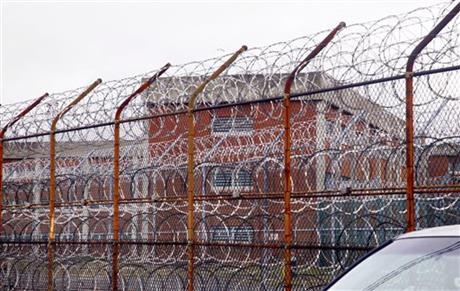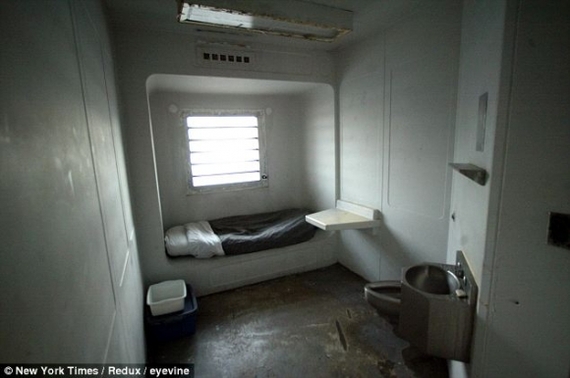The New York City Council is investigating mental health services and violence on Rikers Island and in other city jails as recent media reports have renewed the public's interest on this topic. At a recent oversight hearing conducted by the council, mayoral officials, union leaders, corrections officers, civilians working in city jails and other advocates testified to their experiences. Notably absent from the discussion were people with personal experience inside the cell blocks; with 120,000 people each year churning through city jails -- over 1 million over the past ten years -- it seemed incongruous that the Criminal Justice and Mental Health Committees of the City Council had not included these voices. The City Council legal department has declined to provide us with the list of official invitees to the hearing.
More than 75 percent of the people on Rikers Island and in other city jails are not in custody due to a conviction. They are in jail on bail, sometimes as low as $250, because they cannot afford to meet this cash obligation. According to the Criminal Justice Agency, just 12 percent of people accused of misdemeanors are able to post bail at arraignments. Prosecutorial requests for bail and the choice to insist on cash bail when other options are legally viable, is a matter of public policy. And so we have decided to place people accused of the most minor of crimes in jail solely because they have been locked out of the social and economic resources and opportunities that would otherwise enable them to post a couple of hundred dollars as collateral. A recent Vera Institute report on the Manhattan District Attorney's office found that race plays a significant factor in making bail determinations.
A homeless man arrested for trespassing, like Jerome Murdough who unable to pay $2500 bail subsequently died in a Rikers Island solitary confinement cell, is more likely to be held in city jails than a Bernie Madoff, a Richard Haste, a John Gotti. And it is these indigent people who are subjected to solitary confinement and other abuses in city jails.
The following narratives have been collected by Brooklyn Defender Services' Jail Services. Our hope is that their voices will be included as the City moves toward policy changes that will most directly impact those people in our city who are accused of committing specific categories of crimes and unable to afford bail. In addition to these three stories, there are literally thousands of others, which thus far have gone unheard to most of the public. Names, dates and identifying information have been necessarily changed to prevent retaliation against those clients who may remain in City custody.
- 1)Client Interview TC - GRVC solitary confinement unit
TC was placed in isolation three weeks ago after a confrontation with a correction officer that left him in significant physical pain to his face, neck and back. He reports a diagnosis of paranoid schizophrenia and currently takes Remeron -- an antidepressant -- and additional sleep medications and prescriptions that he is unable to name. He is suffering from depression, anxiety, anger, feelings of being trapped, lethargy, loss of appetite, frustration, hopelessness, insomnia and physical pain. He has been overcome by fear of bugs in his cell, including ants, spiders and bugs he has never seen before, and it's unclear if he is reporting an actual infestation or a hallucination. His neck pain has persisted during the weeks he has been in solitary confinement but his requests for medical care have been denied by staff. He said that he doesn't believe that mental health staff will help him. His mental health symptoms have worsened due to the high heat in his unit, which he guesses reaches over 80 degrees each day. TC has no clean underwear, socks or undershirts.
He has had trouble controlling his impulses while confined in isolation; he started a fire in his cell the last time he was in isolation and his having similar impulses today. He wants to break everything in his cell, pull the furniture off the wall and recently attempted to destroy his sink by beating it with his bare hands. His agitation has been worsened by the denials of privileges in isolation.
TC reports that he last had access to a shower more than a week ago. He has been bathing in his sink. He has been refused out-of-cell time and recreation, having last exited his 8x10-foot cell ten days ago. He has been denied access to the phone for at least five days. TC reports that there is often inadequate food on his unit and that despite his many food allergies, he has been denied access to a nutritionist. TC missed his most recent court appearance because officers refused to bring him out of isolation, even as they informed him that he was missing court.
WK arrived at the interview in waist chains, handcuffs, shackles and walked with a limp using a cane. He was initially placed in isolation two months ago after splashing a corrections officer with a wet T-shirt after a shower. He was charged with assaulting an officer, disobeying a direct order and disruption of institutional programming. At an infraction hearing he was found guilty of only the disobeying an order charge and sentenced to six days in solitary confinement.
Three days later he was placed in the shower in waist restraints and handcuffs that were already broken. He was accused of breaking the handcuffs in the shower and charged with destruction of property and disobeying an order. He was found guilty of disobeying an order and sentenced to an additional ten days in solitary confinement.
During the next day he was granted an out-of-state telephone call to check in with his mother who is suffering from cancer. After arriving at the program office at which all out of state calls on the unit must be made, the officer there said he was not allowed to use the phone because it was in a General Population area he was unauthorized to be in due to his infraction status. WK resisted officers' attempts to bring him back to his cell without the phone call and was brought to the ground. Because he was in waist chains he was unable to protect himself during the fall and broke bones in his fingers and hand. He was found guilty of disobeying an order and sentenced to an additional ten days in the box.
On the following day, after being permitted to leave his cell, WK refused to go back into his cell before speaking with his mother. He requested an opportunity to plead his case to a supervisor. He was charged with and found guilty of disobeying a direct order and sentenced to an additional twenty days in solitary confinement.
After being held in solitary confinement for two months, WK still has an additional sixty days of infraction time to fulfil before he can leave isolation. He reports having lost the ability to control himself when he is denied basic needs as a result of having lost all connection with people important to him during his punishment in solitary confinement. He reports that isolation has led him to feel depressed and hopeless, and that he constantly feels overwhelmed.
DR was issued a ticket earlier this year after a corrections officer alleged that he saw something in DR's rectal cavity during a cell search. As a result of the accusation he was sent to isolation, in a contraband unit, after being told he would be released in 72 hours. He stayed in the cell for eight days, until he was finally released by a Deputy Warden along with several other prisoners who had been held in the unit, some for as long as one and two months.
The toilets in this unit do not flush, to allow for staff to conduct contraband searches. Waste was left in DR's toilet for five days and to ward off illness from the smell he covered the toilet with newspapers, clothing and personal effects. Other people blocked food slots, and kicked their cell doors around the clock in order to persuade corrections officers to move them to a clean cell. DR was denied showers, phone usage, reading and writing material, out-of-cell time, visits, court appearances and cell cleanings.
He was released from these conditions by the Deputy Warden who ordered every person held there to a new cell, apparently finding that many people had been placed in the unit in error and had been isolated for too long.
DR finally received an infraction hearing for the initial offense several days after his week-long stint in the contraband cell. His infraction ticket indicates that no contraband was found by the corrections officers during the search, despite the accusations. During the search DR was stripped naked, assaulted and pepper-sprayed after objecting to the treatment. He cleared an x-ray with no contraband recovered. He was issued a ticket for resisting staff, disobeying a direct order and disrupting institutional programming and sentenced to twenty days in isolation. His previous time in isolation, apparently in error, did not count toward these new days.
--
Riley Doyle Evans is Brooklyn Defender Services' Jail Services Coordinator. He conducted the interviews included in this report and can be reached at rdevans@bds.org.


